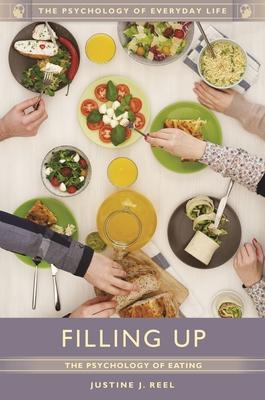Benefiting readers ranging from students researching topics in food, psychology, and eating disorders to parents and general readers seeking to better understand a variety of issues regarding the psychology of food and eating, this book examines a wide range of complex issues, such as emotional eating, food as a form of social bonding and personal identity, and changes in eating throughout the lifespan.
Filling Up: The Psychology of Eating addresses a broad subject area that some may rarely think about but that actually encompasses topics relevant to all individuals, regardless of culture or ethnicity. Eating is often an emotionally charged event, and as such, it involves powerful feelings, thoughts, and emotions. Why are we driven to eat what we do and how we do, what are the current controversies and debates that surround the psychology of eating, and how are eating patterns outside of the United States different than ours--and why? A new addition to the Psychology of Everyday Life series, this book provides a comprehensive examination of issues surrounding food and eating across the lifespan and around the globe. Many of the positive aspects of food, such as social bonding and continuance of ethnic identity and pride through food and family traditions, are highlighted, as are the serious negative aspects of eating, such as food-borne pathogens, unhealthy "trendy" diets, and the various health issues that result from over- or undereating. The book identifies and inspects numerous historical trends related to eating styles over time, including the history of fast food, the advent and booming popularity of food trucks, and food-based traditions like the wedding cake. Readers will benefit from scholarly essays that tackle interesting issues--such as whether or not sugar addiction is real and the merits of a Paleo diet--and that examine both sides of the debate and empower readers to reach their own informed opinions.
Benefiting readers ranging from students researching topics in food, psychology, and eating disorders to parents and general readers seeking to better understand a variety of issues regarding the psychology of food and eating, this book examines a wide range of complex issues, such as emotional eating, food as a form of social bonding and personal identity, and changes in eating throughout the lifespan.
Filling Up: The Psychology of Eating addresses a broad subject area that some may rarely think about but that actually encompasses topics relevant to all individuals, regardless of culture or ethnicity. Eating is often an emotionally charged event, and as such, it involves powerful feelings, thoughts, and emotions. Why are we driven to eat what we do and how we do, what are the current controversies and debates that surround the psychology of eating, and how are eating patterns outside of the United States different than ours--and why? A new addition to the Psychology of Everyday Life series, this book provides a comprehensive examination of issues surrounding food and eating across the lifespan and around the globe. Many of the positive aspects of food, such as social bonding and continuance of ethnic identity and pride through food and family traditions, are highlighted, as are the serious negative aspects of eating, such as food-borne pathogens, unhealthy "trendy" diets, and the various health issues that result from over- or undereating. The book identifies and inspects numerous historical trends related to eating styles over time, including the history of fast food, the advent and booming popularity of food trucks, and food-based traditions like the wedding cake. Readers will benefit from scholarly essays that tackle interesting issues--such as whether or not sugar addiction is real and the merits of a Paleo diet--and that examine both sides of the debate and empower readers to reach their own informed opinions.Hardcover
$51.11